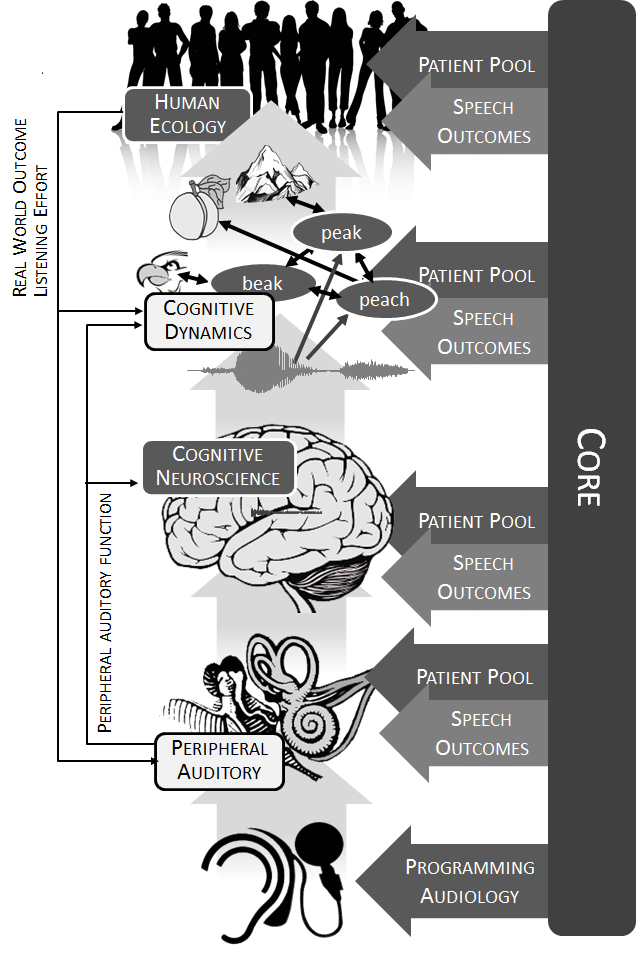
The Department of Otolaryngology in the University of Iowa Carver College of Medicine is internationally renowned for its research into cochlear implants. Neuroscience researchers in the College of Liberal Arts and Sciences are proud to support that work.
The latest National Institutes of Health grant supporting research by the Iowa Cochlear Implant Clinical Research Center—led by Dr. Bruce Gantz, the Brian F. McCabe Professor of Otolaryngology—has the potential to develop a better understanding how the brain processes speech and noise and impacts higher-level language processing.
Innovatively using cutting-edge basic-science tools and techniques, faculty members in CLAS are key contributors to the research as Primary or co-Primary Investigators (PI) on four sub-projects of the grant.
- Professor Ruth Bentler of the Department of Communication Sciences and Disorders is PI on the Human Ecology sub-project, which aims to determine—partly through the use of smartphone apps—the impact of cochlear implant intervention on users' outcomes in their natural environments and to clarify what individual factors can affect these real-world outcomes.
- Professors Paul Abbas and Carolyn Brown of the Department of Communication Sciences and Disorders are co-PI's on the Peripheral Electrophysiology sub-project, which characterizes differences among individuals based on how structures in the inner ear response to sound and electrical stimulation. To accomplish this, they are measuring electrical signals straight out of the cochlea and combining that with genetic-study techniques. The results will be used to characterize the underlying source of differences in performance and to explore possible causes for the loss of acoustic hearing some individuals experience during the first two years of implant use.
- Professor Bob McMurray of the Department of Psychological and Brain Sciences is co-PI—with Tim Griffith of Newcastle University—of the Central Auditory Integration and Plasticity sub-project, which aims to understand the cognitive and neural bases of hearing-impaired listeners’ ability to detect complex auditory objects in noisy environments, arguably the most important deficit faced by such listeners. The investigators are using positron emission tomography (PET), a type of molecular imaging, to capture whole brain activation. This understanding will help improve cochlear implantation criteria, refine signal processing strategies, develop new outcome measures, and identify the cause of poor outcomes when they lie in cognitive or neural processing rather than in the auditory input.
- McMurray is also PI on the Cognitive Dynamics of Language Processing project, which seeks a better understanding of the cognitive mechanisms by which hearing-impaired listeners (including cochlear implant and hearing aid users) map the auditory signal to meaning, and how these mechanisms adapt to compensate for poor input. The research is using eye-tracking to trace out people’s language processing millisecond by millisecond. This will improve cochlear implantation criteria, outcome measures, post-remediation therapies, and signal-processing strategies in cochlear implants and hearing aids.
McMurray notes that the grant is comprehensive.
"Hearing and hearing loss isn’t just about the ear. For the first time, we’re looking at everything, from the social environment to the auditory periphery to the brain," McMurray said. "To put that in perspective, people with hearing loss change their lives to adapt—they stop attending live music or noisy restaurants, and their ability to interact socially is hampered. Ruth Bentler's sub-project is going to examine that dynamic. Paul Abbas and Carolyn Brown's sub-project takes it to the next step—as information hits the auditory nerve, what adaptations occur to support better hearing? But hearing doesn’t stop there—the brain has to figure out how to deal with this new input, and people have to adapt their language systems; that takes about a year after people get their cochlear implants. The sub-projects I'm working on look into those questions."
The grant, funded by the National Institutes of Health/National Institutes of Deafness and Other Communication Disorders, will provide $12.3 million over five years.
Photos l-r: Bruce Gantz, Ruth Bentler, Paul Abbas, Carolyn Brown, Bob McMurray




